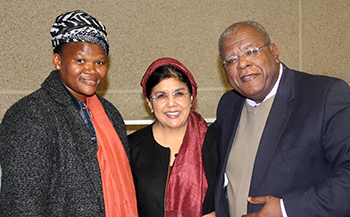Latest News Archive
Please select Category, Year, and then Month to display items
27 December 2019
|
Story Dr Cindé Greyling
|
Photo Supplied

KovsieInnovation at the UFS is bridging the gap between industry and academics with a powerful force. For too long, research remained an academic pursuit, with many innovative ideas stuck between the pages of a thesis – only to come alive during exclusive, short-lived conference proceeds.
KovsieInnovation
Recently, Gerard Verhoef, Director in the Directorate: Research Development (DRD), and his team from KovsieInnovation finalised their Innovation and Commercialisation Strategy in order to create a structured pathway for good ideas. The primary objective of KovsieInnovation – the UFS Innovation and Entrepreneurship Office – is to achieve sustainable growth in third-stream income from innovative research activities stemming from the UFS. “Potential successful ideas must be feasible, viable, and sustainable, and we formulated an eight-step plan to facilitate this,” Verhoef explains. Ultimately, the DRD wants to attract new and continuous research as a renowned academic knowledge partner that can foster, drive, and successfully commercialise innovative research activities; and in doing so, foster an entrepreneurial culture at the UFS.
Liquid Culture
One such success story is the development of Liquid Culture into a business of choice, supplying liquid yeast to breweries and bakeries. Christopher Rothmann and Dr Errol Cason are the driving forces behind this company that produces their sought-after and stable yeast product in the Department of Microbiology, Biochemistry and Food Biotechnology at the UFS. With world-class equipment and laboratories, they house one of the largest yeast-culture collections in the world.
Both Rothman and Dr Cason were home brewers for many years before starting to produce commercial batches. They believe it would not have been possible without the help of KovsieInnovation. This project was also one of the finalists in the National Entrepreneurship Intervarsity.
Christo Strydom Nutrition (CSN)
Another innovative way in which the UFS generates third-stream income via the DRD, is by partnering with already successful commercial products. One such example is the recent successful royalty agreement with CSN. With this transaction, the university unlocked its brand potential to the benefit of both the industry partner and the UFS. Quality assurance remains the key success factor for deals like this.
Beauty personified through written word
2016-07-29

Dr Thozama April, University of Fort Hare
historian, Zubeida Jaffer, current Writer-in-Residence
in the Department of Communication Sciences
at the UFS and author of Beauty of the Heart:
The life and times of Charlotte Mannya Maxeke
and Prof Jonathan Jansen, Vice-Chancellor and Rector
of the UFS at the book launch of Zubeida Jaffer.
Photo: Rulanzen Martin
“It is quite easy to write a book in a professional capacity but very difficult to write a book from the heart.”
These were the words of Prof Jonathan Jansen, Vice-Chancellor and Rector of the University of the Free State (UFS), at the launch of Beauty of the Heart: The life and times of Charlotte Mannya Maxeke by Zubeida Jaffer, the current Writer-in-Residence in the Department of Communication Sciences at the UFS.
Perseverance and dedication yields results
Writing a book from the heart is exactly what Jaffer, an award-winning South African journalist and author, set out to do. “When you make the choice to write a story, you need to be very dedicated,” she said.
As this is Jaffer’s third book, one would think that she would have no difficulty in putting pen to paper. On the contrary, she mentioned that it was, in fact, the hardest book she has written because the narrative was not easy to get hold of.
“I wanted Charlotte’s voice to come through, and it took my team and I three years of research and writing,” she said.
Maxeke’s story helps to shape South African society
The three-person panel, hosted by the UFS Sasol Library and SUN MeDIA, and chaired by Prof Jansen, included Jaffer and Dr Thozama April, University of Fort Hare historian who had done her PHD thesis on Maxeke.
Dr April said that Maxeke’s life story is an inspiring one, as it encourages a rethinking of established narratives. “These established narratives have made it possible for historians and researchers to write about the shaping of South African society,” she said.